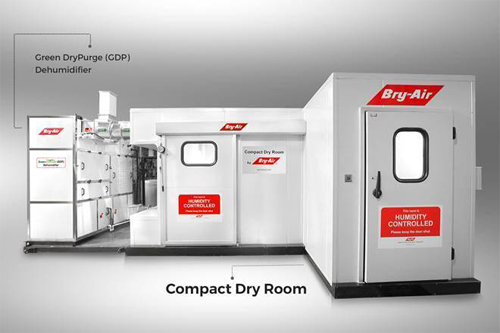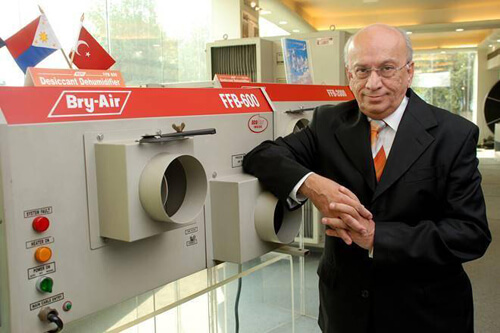Made in India for the rest of the world, ultra-low dew point and energy-efficient Green DryPurge (GDP) dehumidifiers are available to fulfill all the moisture control needs to build safe cars for a better tomorrow.
As we set out towards a ‘greener environment’, the emergence of electrically powered vehicles will be more evident than ever before. While the overall numbers of electric vehicles (EVs) remain at a low level on a global scale, the need for personal vehicles will increase given the new normal where maintaining social distancing is a norm. The need for more lightweight, yet sturdy structures running on superior quality tyres will continue to pick up the pace because driven by consumer demand the industry will push EV two-wheelers, cars in their view to create a sustainable mode of commuting, and as the companies continue to deploy electric fleet.
In offering EV to consumers at a suitable price point, the safety of the vehicles will continue to be a constant and thus the giving rise to the need for dehumidification systems in the automobile sector. The design of an EV vehicle is not radically different from a traditional ICE vehicle, with the main difference being the design and use of materials under the hood. In the post-COVID-19 scenario, as the demand for EV increases the HVAC&R industry will see a rise in demand for dehumidification systems and solutions. From structure to the other smaller parts for beatifying the car while keeping it lightweight to the lithium battery, everything would require environment control solutions throughout the manufacturing process as manufacturers seek to squeeze costs and lay major emphasis on energy efficiency.

Starting from the heart of the EV, lithium batteries require a high level of environmental control while assembling and manufacturing. Lithium battery production is undertaken in very critical and controlled (Dry Room) environment conditions. Non-maintenance of the desired RH during lithium cell manufacturing (<1%) and battery assembling (<10%) may lead to severe consequences including reduced quality, bad performance, and increased chances of explosion. Dehumidification, or moisture control, has proven itself to be a critical factor in the control of the environment in the Dry Rooms without which lithium battery manufacturing is not feasible. Dry Rooms come equipped with Environment Control Dehumidification System including the refrigeration system. These rooms are equipped with moisture control equipment that helps in achieving extremely low dewpoint [up to (-) 80 °C] control for all the hygroscopic and moisture sensitive material processing. Lithium and alternative battery manufacturers are today the most vulnerable and hence, are driving the high requirement for Dry Rooms in India and the dehumidifiers across the globe.
Deepak Pahwa, Chairman, Pahwa Group and Managing Director, BryAirFrom the structure to the tyres, to ensure the safety of a vehicle the manufacturing plays a vital role and there are various environmental factors that can be detrimental to the quality produced in an automotive manufacturing plant. Due to the nature of the manufacturing, the area surrounding the creel room may be at a temperature and humidity higher than normal ambient conditions. During the manufacturing process of radial tyres, presence of high humidity leads to rusting of steel wires, which results in large rejection rate and loss of strength as rusting prevents proper bonding between the steel and rubber. Similarly in an engine testing room (facility to develop and test the engines of automobiles), high humidity can affect the engine testing facility operations.

Dehumidification technology maintains the consistency of moisture in the creel room as well as during engine testing, at the paint booths, as well the plastic parts manufacturing facility by continuously calculating the moisture load and pushing sufficient make-up air to provide positive pressure in the space. The first non-invasive contaminating sensors, the Moisture Minder provides a real-time online analysis of moisture content in hygroscopic plastic through sensors. Moisture Minder gives the control room total integration and production traceability of moisture data by collecting production process information and optimising product allocation.
Talking of the car finish, the outer structure and overall built of a car- Did you know that out of 30,000 parts in your car, one-third are made of plastic? Plastics and polymers used to make an automobile consists of 39 different types and comes from mainly four polymers: polypropylene, polyurethane, polyamides and PVC. Over years plastic has become one of the key materials required for the structure, performance, and the safety of a vehicle due to its lightweight properties for fuel efficiency and lower greenhouse gas emissions.
Similarly, engineering plastics such as ABS, Polycarbonate, Nylon, Acrylic, SAN, etc., used in automobiles have a high affinity towards moisture. They absorb moisture during manufacturing, transportation and storage prior to processing. Improper and inadequate drying of the resin leads to poor surface finish and loss of physical properties such as structural and impact strength.
In India, especially, with the government pushing to become the EV first nation by 2030, the local manufacturers are fully geared up to serve the upcoming need from the automobiles industry. Made in India with pride for the rest of the world, these ultra-low dew point and energy-efficient Green DryPurge (GDP) dehumidifiers are available to fulfill all the moisture control needs to build a safe and secure car for a better tomorrow.
Author: Deepak Pahwa, Managing Director, Bry-Air (Asia)
Disclaimer: The views and opinions expressed in this article are solely those of the original author. These views and opinions do not represent those of The Indian Express Group or its employees.




